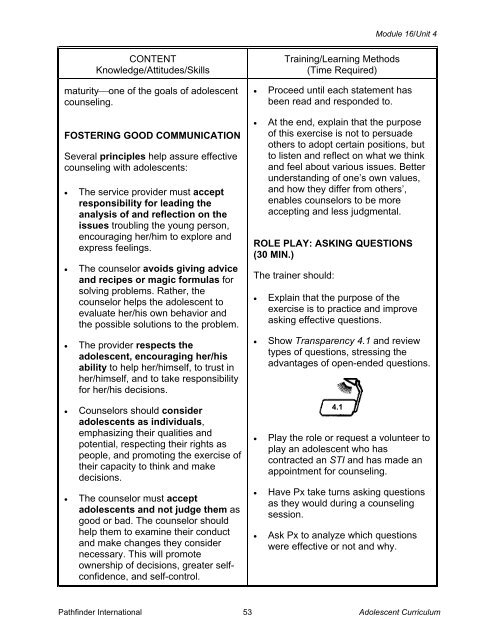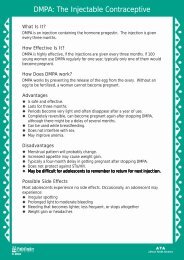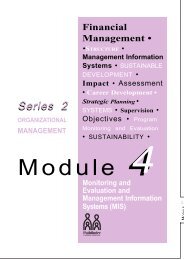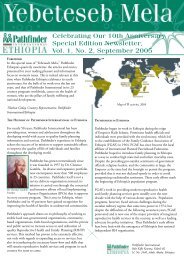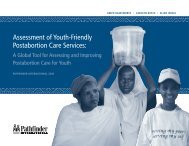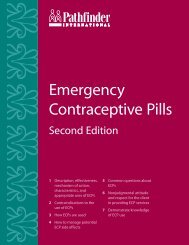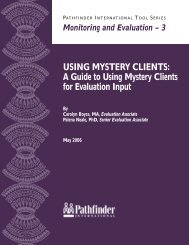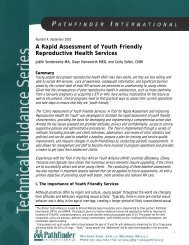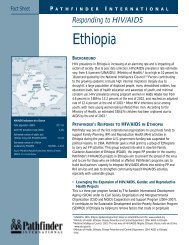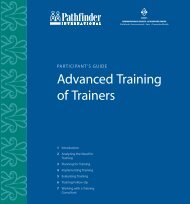reproductive health services for adolescents - Pathfinder International
reproductive health services for adolescents - Pathfinder International
reproductive health services for adolescents - Pathfinder International
Create successful ePaper yourself
Turn your PDF publications into a flip-book with our unique Google optimized e-Paper software.
Module 16/Unit 4<br />
CONTENT<br />
Knowledge/Attitudes/Skills<br />
maturity⎯one of the goals of adolescent<br />
counseling.<br />
FOSTERING GOOD COMMUNICATION<br />
Several principles help assure effective<br />
counseling with <strong>adolescents</strong>:<br />
• The service provider must accept<br />
responsibility <strong>for</strong> leading the<br />
analysis of and reflection on the<br />
issues troubling the young person,<br />
encouraging her/him to explore and<br />
express feelings.<br />
• The counselor avoids giving advice<br />
and recipes or magic <strong>for</strong>mulas <strong>for</strong><br />
solving problems. Rather, the<br />
counselor helps the adolescent to<br />
evaluate her/his own behavior and<br />
the possible solutions to the problem.<br />
• The provider respects the<br />
adolescent, encouraging her/his<br />
ability to help her/himself, to trust in<br />
her/himself, and to take responsibility<br />
<strong>for</strong> her/his decisions.<br />
• Counselors should consider<br />
<strong>adolescents</strong> as individuals,<br />
emphasizing their qualities and<br />
potential, respecting their rights as<br />
people, and promoting the exercise of<br />
their capacity to think and make<br />
decisions.<br />
• The counselor must accept<br />
<strong>adolescents</strong> and not judge them as<br />
good or bad. The counselor should<br />
help them to examine their conduct<br />
and make changes they consider<br />
necessary. This will promote<br />
ownership of decisions, greater selfconfidence,<br />
and self-control.<br />
Training/Learning Methods<br />
(Time Required)<br />
• Proceed until each statement has<br />
been read and responded to.<br />
• At the end, explain that the purpose<br />
of this exercise is not to persuade<br />
others to adopt certain positions, but<br />
to listen and reflect on what we think<br />
and feel about various issues. Better<br />
understanding of one’s own values,<br />
and how they differ from others’,<br />
enables counselors to be more<br />
accepting and less judgmental.<br />
ROLE PLAY: ASKING QUESTIONS<br />
(30 MIN.)<br />
The trainer should:<br />
• Explain that the purpose of the<br />
exercise is to practice and improve<br />
asking effective questions.<br />
• Show Transparency 4.1 and review<br />
types of questions, stressing the<br />
advantages of open-ended questions.<br />
4.1<br />
• Play the role or request a volunteer to<br />
play an adolescent who has<br />
contracted an STI and has made an<br />
appointment <strong>for</strong> counseling.<br />
• Have Px take turns asking questions<br />
as they would during a counseling<br />
session.<br />
• Ask Px to analyze which questions<br />
were effective or not and why.<br />
<strong>Pathfinder</strong> <strong>International</strong><br />
53<br />
Adolescent Curriculum


